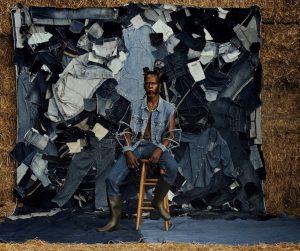 Pierre Kwenders couldn’t be any prouder when we reached him on the phone. “I was really anxious for this album to finally come out,” he says, almost relieved, as he discusses Jose Louis and the Paradox of Love.
Pierre Kwenders couldn’t be any prouder when we reached him on the phone. “I was really anxious for this album to finally come out,” he says, almost relieved, as he discusses Jose Louis and the Paradox of Love.
Released in April 2022, Kwenders’ third solo album (sung in Lingala, French, English, Tshiluba, and Kikongo) arrives five years after his Félix-winning and Polaris short-listed predecessor, MAKANDA at The End of Space, the Beginning of Time. “I started working on the third one immediately after the second,” he says. “My goal, initially, was to release something in 2020, but we all know what happened… It gave me a lot of time, and I’m very grateful that I had that time. It allowed me to fine-tune my work, to re-write some of the lyrics, and to end up with something near-perfect.”
This time also allowed the Québécois artist to bring together an impressive lineup of collaborators from around the world, including Parisian producer, DJ, and singer Sônge, French-Senegalese artist anaiis, Chilean producers Esqo and Carlomarco, as well as Portuguese DJ and producer João Branko Barbosa, of Buraka som Sistema fame. Through it all, Kwenders acts as a conductor.
“I’m comfortable in that role. My main goal is to give my collaborators space to express themselves, even though they’re in Pierre Kwenders’ realm,” he explains. “We artists generally have big egos. I even have a song titled “Ego” [a 2020 duet with Clément Bazin]. But it’s important to set that aside to give way to a healthy collaboration.”
The song “L.E.S.” (which stands for “Liberté, Égalité, Sagacité”) is a perfect example of this “healthy collaboration” philosophy. Zimbabwean-American producer Tendai Baba Maraire – ex-member of the experimental rap duo Shabaaz Palaces, and Kwenders’s loyal collaborator – initiated the composition, before re-working it with producer and DJ King Britt at his home in Philadelphia.
“It was going well, but I still had no words, something was missing,” says the Montréal-based Kwenders. “And at some point in 2019, I was in New Orleans, and Tendai was there, too. I called Win Butler and Régine Chassagne [the two members of Arcade Fire who live there], and we just started jamming. The energy was unbelievable. I grabbed a mic and we started recording. My voice as you hear it on that track is the actual recording from that jam session. I kept it as is. The problem was that the song was now 35 minutes long!” he laughs. “I came back to it with a clear head, and we boiled it down to a nine-minute version.”
As the album’s opener, the song sends a clear message: “It says, ‘I’m inviting you, welcome to my idyll.’ It’s a journey, a call that begins with the sound of percussion and guitars that build gradually,” says Kwenders. “The energy level slow grows and grows.” Step by step, we enter the realm of this sonically rich and diversified album, which goes through ambient and dance-ier phases, peppered with electro, pop, R&B, Congolese rhumba, and coupé-décalé, Côte d’Ivoire genre that’s conquering the world, thanks to its percussion, African music samples, and penetrating bass.
Jose Louis and the Paradox of Love bears the traces of Kwenders’ travels over the past four years, notably in Santiago, Lisbon, Seattle, New York, and Philadelphia – all of them cities where the album was recorded. “Travelling opens your mind,” says the man who’s travelled the world with his Moonshine events, an evening of music that’s become emblematic of Montréal’s nightlife. “That’s how you come in contact with other cultures, and see how other people live. Each time I leave to go somewhere, I want to discover new artists.”
It would be a misnomer to say Kwenders’ third album is a collaboration album, if only because, in the words of its creator, it’s his “most personal to date.
“These last few years, I was involved in romantic relationships that made me think a lot. Thinking about myself, my sexuality. I felt like recounting my experiences, the man I’ve become,” he confides. “I limited my self-expression for a long time. I’ve learned to be a better version of me while I was working on this album.”
“Your Dream,” a duet with Québécois singer-songwriter Ngabo, is an affirmation of Kwenders as an artist. The song is especially dedicated to his mother, whose voice – on a grainy voicemail recording – can be heard at the beginning and end of the song.
“That song is a love letter,” says Kwenders. “It’s my way of thanking my mom, despite her doubts about my intentions when I quit accounting to dive into music. I came up with this song to reassure her, to tell her that deep down, it’s thanks to the education she gave me that I’m the artist I am today. Our parents have wonderful dreams for us, but sometimes we have different dreams, and we shouldn’t stop ourselves from living them. We must embrace them and live them fully.”